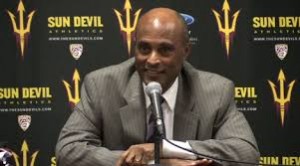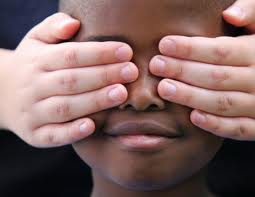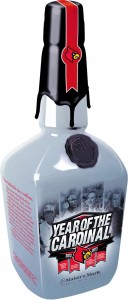Posted on January 21st, 2014
 By HOWARD MANN
By HOWARD MANN
The overwhelming majority of student-athletes at Howard and other HBCUs – just like the preponderance of their peers at predominantly white colleges and universities – will never cash a single paycheck for playing sports.
That’s why it’s vitally important to offer them a quality education and encourage them to take their academics as seriously as their athletics. They just might end up in a state legislature and broadcast booth, like former Howard quarterback Jay Walker.
Or they could work their way through the business side of sports. They could go from law school to a sports agency to an NFL team to NFL headquarters, before being picked to run a FBS athletic program.
Like former Stanford athlete Ray Anderson.
Currently completing his eighth season as the NFL’s executive vice president of football operation, Anderson will start his new gig – Arizona State’s vice president for athletics – after the Super Bowl. He joins a very short list.
According to the most recent report from The Insitute for Diversity & Ethics in Sport, of the 120 athletic directors at FBS schools, only nine were African-American as October 2012.
Unlike the others, Anderson doesn’t have any prior experience as an administrator at the collegiate level. But Arizona State president Michael Crow had a ready explanation for the hire during Anderson’s introductory press conference on Jan. 9.
“I have no doubt Ray can be a significant contributor to whatever we need to do to advance whatever resouces we need to move Sun Devil athletics forward,” Crow said. “Here we have a person that has demonstrated that he can learn, adapt, solve problems and move forward in any circumstances he encounters.”
That could be a motto for our Howard students, athletes and non-athletes alike:
“Learn, adapt, solve and advance – regardless.”
Posted on January 20th, 2014
 By DERON SNYDER
By DERON SNYDER
We’re accustomed to hearing racists and bigots argue that black folks need to get over the issue of skin color. But a lot of well-intentioned liberals suggest the same thing, too, kind-hearted individuals who say they forget sometimes that President Obama is black – and that’s meant as a compliment!
Unfortunately, both groups have misconstrued a portion of Martin Luther King’s “I Have A Dream” speech, which is shame as we celebrate his birthday once again.
King never said a word about anyone’s eyesight. So why do people insist we must lose our vision to achieve his dream?
I’m talking about the poor, misguided souls who believe that “colorblind” is the ultimate goal, the litmus test for our nation finally overcoming its contentious racial history. I’m talking about the folks who sniff, “I don’t see color,” as if that’s a sign of moral superiority.
Actually, it’s a sign of total denial.
King’s message has been co-opted and contorted by those who won’t acknowledge that white privilege exists, or won’t acknowledge the role it played – and continues to play – in current conditions. If they can ignore the visual differences between light and dark skin, it’s easier to ignore the socioeconomic differences (and political consequences).
Some folks honestly and naively believe they’re subscribing to King’s principles, pointing to a part of the speech where King dreamed “my four little children will one day live in a nation where they will not be judged by the color of their skin, but by the content of their character.”
I absolutely, positively agree: Skin color should never be a basis for judgment. So let justice be blind.
The rest of us have no good reason to forsake the blessing of sight. Being “colorblind” is absurd, as fanciful as suggesting we can be “heightblind” or “weightblind.” It’s as realistic as noticing no distinctions between blondes and brunettes, or perms and dreadlocks.
There’s a huge difference between acknowledging that people (gasp!) come in different colors, and determining the treatment of people based on color.
Noting the obvious doesn’t constitute a character flaw. When you’re trying to describe someone or help a friend realize who you’re talking about, it’s fine to say, “Well, she’s kind of tall,” or “He’s kind of chubby.” No one has a problem with you using those characteristics in a description. “But you offend the colorblind camp’s sensibilities if a description includes, “He’s dark-skinned,” or “She’s white.” In their warped sense, it’s like you’re passing judgment.
And that’s the genesis of the problem, the historical assignment of values to skin color. As the old saying goes, “Light is alright; brown can stick around; black can get back.” A preponderance of research shows that pigmentation variations lead to dissimilar treatment – often subconsciously – both from outside and within ethnic groups. It might be your initial response to flashing pictures of light and dark faces. Or little black girls favoring white dolls. Or black and white candidates, with identical credentials, receiving opposite results at the bank, the rental office or the job interview.
Ignoring blatant differences in melanin isn’t the solution. We can revel in our colors without ranking them. If we couldn’t enjoy the splendor of rainbows or the spectrum of roses, life wouldn’t be as sweet. Likewise, if we can’t enjoy the beautiful variety of our skin colors, shades and hues, our picture is cut short. We’d be deprived, unable to savor the range of complexions from Halle Berry and Serena Williams to Angelina Jolie and Cicely Tyson. From Soledad O’Brien and Oprah Winfrey to Michelle Obama and Gwen Ifill. (Women, substitute males of your choice).
No one needs to be colorblind. We can enjoy people for who they are and see them for who they are – without letting color impact our perceptions or limit their possibilities. I’m positive that’s what King meant. I’m certain he would agree with his lieutenant Jesse Jackson, who said at the 1984 Democratic National Convention, “Our nation is a rainbow – red, yellow, brown, black and white – and we’re all precious in God’s sight.”
You don’t deny the existence of something precious, something that’s a gift from God. You celebrate it. That’s what Carter G. Woodson did when he instituted “Negro History Week” in 1926, to compensate for glaring omissions – kind of like “black holes” – in textbooks and social consciousness. The relevancy and importance is no less today, two generations removed from the Civil Rights Act.
So to all the well-meaning “colorblind” folks out there: Take off the blinders! It’s not like they actually work.
And we should be glad that they don’t.
Posted on January 17th, 2014
 By HOWARD MANN
By HOWARD MANN
Booze and college is often a touchy subject, considering our society’s problems with underage drinking, drunk driving, date rape, etc. But that sensitivity hasn’t stopped the University of Louisville from engaging in a creative fundraising project with a … um … “spirited” corporate partner.
The Cardinal Athletic Fund and Maker’s Mark Distillery are teaming up to raise $1 million toward the creation of an academic center for Louisville’s athletes. The company’s famous Kentucky bourbon is being packaged in a limited edition, “Year of the Cardinal” bottle.
Not available in stores, the 500 specially-designed bottles commemorate Louisville’s historic 2013 – a Sugar Bowl victory in football, College World Series appearance in baseball, national runner-up finish in women’s basketball and national championship in men’s basketball.
The one-of-a-kind bottle is available to Cardinal donors for $2,000, with all proceeds earmarked for the $14 million Academic Center. Once completed, the state-of-the-art facility will house tutor rooms, learning labs and group study areas.
Maker’s Mark and Louisville have a contract for three bottle in three years, but the “Year of the Cardinal” bottle doesn’t count against that total. Previous bottles featured the image of football coach Charlie Strong (who just left for Texas) and men’s basketball coach Rick Pitino.
Bourbon and Kentucky go hand-in-hand, so maybe the partnership was a natural. But what product screams “Washington, D.C.!” and perhaps could be used by Howard University athletics in a fundraising capacity? Where’s the local corporate partner willing to be the Bison’s Maker’s Mark?
The search is on…
 Follow
Follow



